Highway Q3 2025 Freight Fraud Index Shows Direct Thefts Becoming Primary Threat Vector

Summary
Full Article
Highway has released its Q3 2025 Freight Fraud Index, documenting a significant evolution in criminal tactics targeting the freight brokerage industry. The data shows direct thefts have now surpassed compromised emails and ownership-change abuse as the leading fraud vector, with rogue carriers driving substantial financial losses across the supply chain. While total theft volumes showed a slight decrease from Q2 levels, the frequency and sophistication of fraud attempts continued their upward trajectory, signaling heightened risk for brokers, carriers, and shippers during the critical peak shipping season.
The quarterly report reveals that Highway blocked 605,728 fraudulent email attempts and identified 62,531 fraudulent phone numbers during the third quarter. Brokers reported 2,992 identity alerts, while Highway recorded 149 unauthorized Federal Motor Carrier Safety Administration contact changes, demonstrating the persistent manipulation of carrier records that enables account takeover schemes. Through the first three quarters of 2025, Highway has blocked 1,453,129 fraudulent email attempts, already exceeding the total of 914,719 blocked throughout the entire 2024 calendar year.
Michael Grace, VP of Customer Risk Management at Highway, emphasized that despite evolving criminal tactics, effective defense strategies remain grounded in fundamental security practices. Teams that consistently verify identities, confirm rate confirmations through secure channels, and maintain disciplined verification protocols experience dramatically fewer security incidents, demonstrating that disciplined processes consistently outperform complex technological solutions in fraud prevention.
Highway's analysis identifies email takeovers and phishing campaigns as the primary entry points for identity misuse throughout the freight industry. Criminal organizations frequently infiltrate legitimate email threads to intercept rate confirmations, impersonate dispatchers, and redirect payments to fraudulent accounts. Phone-based impersonation is also increasing, with spoofed or Voice over Internet Protocol numbers being deployed to solicit load details or submit fraudulent contact changes that facilitate account takeover.
The geographic distribution of fraud attempts shows continued global operations, with India, Serbia, and Pakistan representing the top countries associated with Q3 attack attempts. Domestically, California, Texas, and Florida showed the highest concentration of fraudulent activity, with increasing pressure observed in Indianapolis-area distribution hubs that serve as critical nodes in national supply chains.
Industry data from FreightWaves supports Highway's findings, reporting that U.S. cargo theft increased 33% year over year in Q2 to 525 incidents, with pilferage accounting for the majority of cases. Mexican theft patterns showed even more concerning trends, with 82% of incidents involving violence and most occurring while trucks were in transit or parked in unsecured areas. These patterns align with the impersonation and strategic theft techniques behind email thread intrusions, dispatcher spoofing, and payment redirection, underscoring the critical need for rigorous identity verification throughout the entire shipping process from tender through settlement.
As the holiday season approaches, Highway has identified elevated risk for specific commodity categories including meat and seafood, frozen foods, consumer electronics, and alcoholic or specialty beverages. Multi-stop routes and high-volume consolidation points present particular vulnerability during this period of increased shipping volume and logistical complexity. Highway recommends implementing fundamental security controls including carrier identity verification through trusted sources, multi-factor authentication on all email accounts, secure channel delivery for rate confirmations, and immediate escalation of any unusual login behavior or account changes for re-verification. More information about Highway's fraud prevention solutions is available at https://highway.com/.

This story is based on an article that was registered on the blockchain. The original source content used for this article is located at citybiz
Article Control ID: 267995